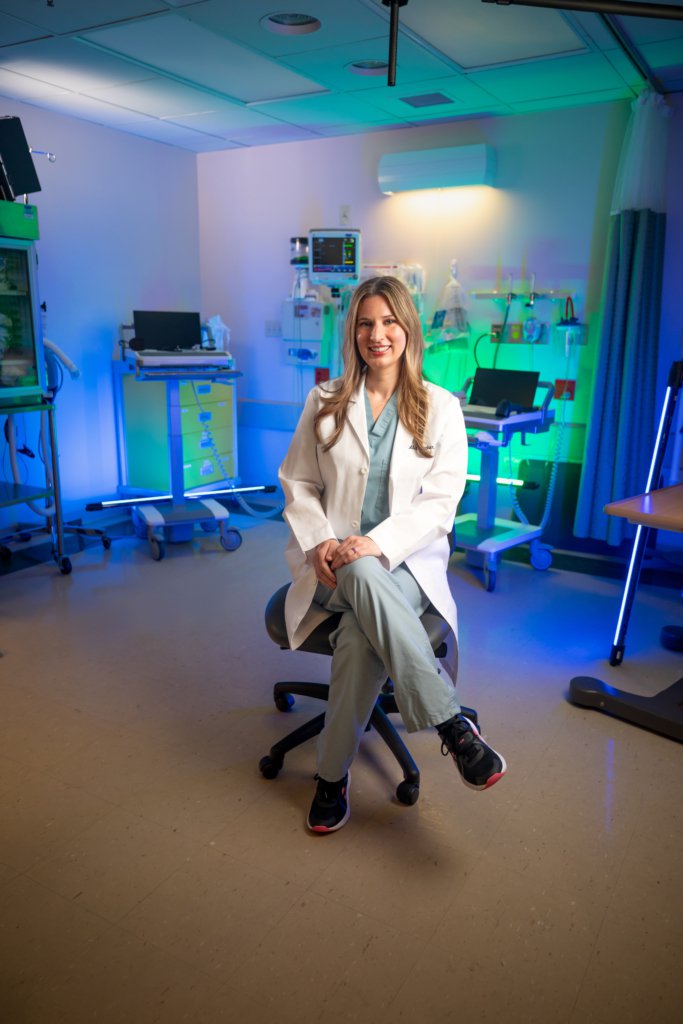As Scheurer Health’s only full-time anesthesia provider, Hollie Thacker, CRNA, embodies the spirit of rural healthcare. With a passion for patient-centered care, she plays a vital role in ensuring that high-quality anesthesia services are available to residents in Pigeon, Michigan.
Thacker’s nursing career started downriver at Henry Ford Wyandotte Hospital’s med-surg department. Here, she was able to shadow in the operating room and learn about the role Certified Registered Nurse Anesthetists (CRNAs) play in patient care. She describes being “instantly interested” in the profession, loving how the science of anesthesia blended with the patient-centered nature of nursing.

Inspired, Thacker joined Henry Ford’s Surgical Intensive Care Unit (ICU) team in Detroit for her intensive care training and then pursued a Master of Science in Nurse Anesthesia from Wayne State University. It was during her clinical rotations that she fell in love with Scheurer Health and knew her future as a CRNA would be in rural health.
“All I’d ever known was the Detroit area and big, major hospitals,” said Thacker, an AANA member since 2018. “It didn’t even cross my mind to consider smaller hospitals in rural areas. Doing my rotation at Scheurer expanded my worldview, and I knew I had to come back and work here. I’ve been in love with the community and being a CRNA here ever since.”
In many rural areas, access to healthcare resources can be limited. CRNAs, also known as nurse anesthesiologists or nurse anesthetists, are the primary providers of anesthesia care in rural America. The residents of rural areas rely on CRNAs like Thacker for timely access to anesthesia care without the need to travel to other facilities, often hours away.
Thacker feels a sense of purpose from the moment she arrives at the hospital. Rural health can be unpredictable, but she is always prepared and ready to provide vital care, whether it’s performing spinals for orthopedic cases or anesthesia support for emergency services. CRNAs are advanced practice registered nurses who must have at least one year of critical care nursing experience prior to attending a nurse anesthesiology program. With over five years of experience as a Surgical ICU nurse, Thacker’s quick decision-making and extensive training is essential in critical moments, and she carries this responsibility with pride.
“I love that I get to practice completely autonomously, but it was a shock at first. At larger city hospitals, you have a team of physicians, physician anesthesiologists, and other CRNAs that you can bounce ideas and concerns off of,” said Thacker. “Here, I’m working independently and making my own decisions—I only have my own experience to fall back on, but I have a lot of trust in my training and education.”
Thacker’s ability to handle anything from routine procedures to urgent, emergency cases exemplify her dedication to nurse anesthesiology excellence. With the many roles rural healthcare providers need to fill for their communities, her experience as a CRNA is never stagnant.
“I love doing laparoscopic and open abdominal cases for General Surgery—they are more involved than other procedures and the challenge is fun,” Thacker explains. “But I also love that I get to do Pediatric ENT. I get to switch gears and be silly and goofy to make the kids feel at ease.” The ability to learn from a wide variety of cases and patients is another aspect of rural healthcare that appealed to Thacker.

Her approach to patient care is professional, but also deeply personal. She takes time to meet with each patient before their procedure and listens to their concerns. Many of her patients are anxious about anesthesia, but Thacker’s warm demeanor and clear communication helps to ease their fears.
“Before, when I worked for hospitals in Detroit, it was easy to get swallowed up in the hustle and bustle. It’s so fast-paced that you don’t always get the luxury of slowing down and taking a few extra minutes to go above and beyond for the patient,” said Thacker. “Now, I’m able to reach them as a CRNA to provide care and educate, but also as a person to give them the comfort that they need.”
To Thacker, working in a rural area is all about building trust. “I’m not just a CRNA to my patients, I’m a part of their community, and I become a part of their lives. It can be a lot of pressure to know that your patient is your neighbor coming in for surgery or your coworker’s child getting their tonsils removed, but being familiar to them can make all the difference,” she explains. “I feel really fulfilled when I’m at a grocery store or out to dinner and a patient will come up and let me know they’re doing great after their procedure.”
As she reflects on her journey, she talks about her career coming full-circle since she’s now in a position to coordinate clinical rotations at Scheurer and precept Resident Registered Nurse Anesthetists (RRNAs). In her experience working with other CRNAs and RRNAs, she is passionate about encouraging them to consider going into rural health.
“There’s definitely a need for more skilled professionals in rural communities,” said Thacker. “I always encourage CRNAs and students to consider this route because it does expose them to truly independent anesthesia practice and gives them a unique setting to be an autonomous CRNA. You’re really able to hone your decision-making skills and sharpen your thought processes when handling cases, and it makes you a better CRNA. I think once they experience what it’s like, they really end up loving it.”
For those contemplating a career in rural healthcare, Thacker offers a piece of heartfelt advice: “Take the leap. There are challenges and obstacles, but it’s so rewarding at the end. You’ll find purpose in every patient you care for.”
To learn more about Thacker’s journey in rural health, read Scheurer Health’s article on her role as their sole full-time CRNA.